 Acer File Extensions |
Advent 7056 Laptop
Specification
| CPU | Mobile Intel Pentium 4 3.20 GHz |
| BIOS | PhoenixBIOS. Press the F2 key to enter. |
| Chipset | Intel 865PE |
| Memory | 512 MB DDR SODIMM (2 memory slots. Max 1GB) |
| Hard Drive | 60GB Hitachi Travelstar IC25N060ATMR04-0 |
| CD Drive | HL-DT-ST DVD-RW GWA-4040N |
| Screen | 15" TFT (Native Res.1024x768) |
| Video Card | nVIDIA GeForce FX Go 5350 (64MB) |
| Sound Card | Realtek AC'97 audio |
| Modem | Intel 537EA |
| Network Card | Realtek 8139 Family PCI Fast Ethernet (onboard) Prism 3890 802.11g wireless (Medion/Z-Com XG-601MB) |
| PC Card | 1x Type I/II |
| Ports | 1x PC card slot 1x Compact Flash Card reader 1x IEEE1394 (FireWire) 4x USB 1x 3-in-1 card reader (supports SD, MMC, and Memory Stick cards) 1x IR 1x Kensington Lock 1x Serial 1x PS/2 1x S-Video (TV Out) 1x VGA 1x Modem 1x LAN 1x Microphone/Center Subwoofer 1x Line Out/SPDIF 1x Line In/Speaker Backwards |
| Battery | BTP-75BM (14.8v 6600mAh) |
| Power Supply | FSP 120-AAC |
| Dimensions | 41 x 324 x 290 (HxWxD in mm) |
| Weight | 3.5kg |
| Made By | Medion WID2010 (MD42418) |
Drivers
Your laptop should have a backup copy of all the drivers, you can find it by browsing to the c:\applications\drivers folder.
Memory Upgrades
This laptop has two memory slots which are accessed by removing the memory compartment cover underneath the laptop (see Laptop Layout section below).
Laptop Layout
Open Case
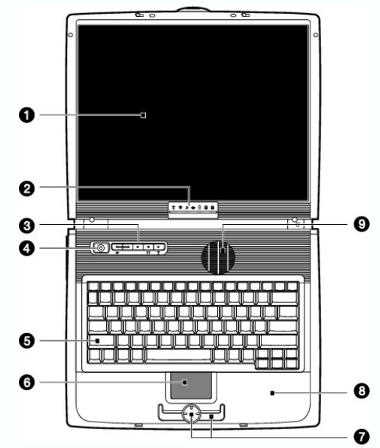
- TFT Display
- Status LED Indicators (see below)
- Hotkeys (see below)
- Power ON/OFF
- Keyboard
- Touchpad
- Touchpad Keys
- Palm Rest
- Fan Slot
Status LED Indicators
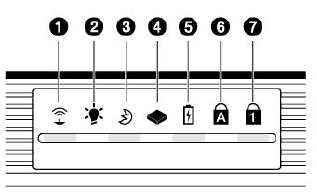
- Wireless LAN activity
- Power/Battery
- Stand-by mode
- Hard disk activity
- Battery charging
- Caps Lock
- Num Lock
Hotkeys
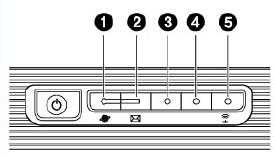
- Launches the email program
- Launches the internet browser
- Enable/disable the tv-out option
- Switches between different screen resolutions (640x480, 800x600, 1024x768)
- Enable/Disable the wireless LAN
Left Side
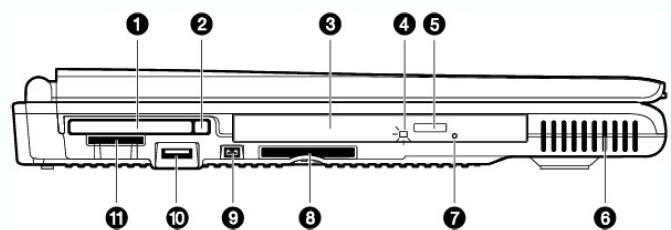
- PC card Slot (PCMCIA)
- PC card eject button
- Optical Drive
- Activity LED optical drive
- Disc eject button
- Stereo Speaker
- Disc emergency eject
- Compact Flash Card reader
- IEEE1394 (FireWire)
- USB Port
- 3 in 1 card interface
Right Side

- Stereo Speaker
- Infrared Port
- Kensington lock
Rear View

- Power Socket
- Serial Port
- PS/2 Port
- TV/Video Out (S-Video)
- External Monitor (VGA)
- USB Ports
- LAN Port (RJ-45)
- Modem Port (RJ-11)
- Microphone/Center Subwoofer
- Loudspeaker Out/SPDIF
- Audio In/Speaker backwards
Bottom View
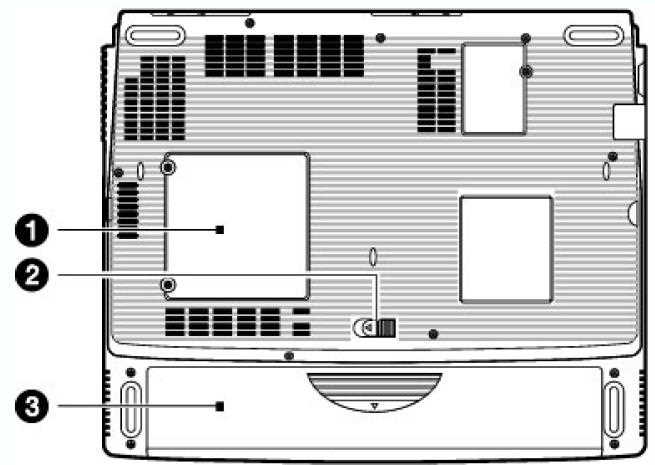
- Memory compartment
- Battery lock/unlock latch
- Battery bay
Function Keys
Fn + F1 - Hot key help menu
Fn + F2 - Sleep button
Fn + F3 - Display toggle. Switches between LCD, external monitor, and both LCD and external monitor
Fn + F4 - Screen blank. Turns the LCD backlight off to save power; press any key to resume
Fn + F5 - Speaker on/off
Fn + F11 - Num lock
Fn + F12 - Scroll lock
Fn + right arrow - Brightness up
Fn + left arrow - Brightness down
Fn + up arrow - Volume up
Fn + down arrow - Volume down
Fn + PgUp - Home. The cursor on the screen will skip to the start of the line.
Fn + PgDn - End. The cursor on the screen will skip to the end of the line.
In the Box
Disks Supplied
- Advent system recovery CD version 3
- Microsoft Works 7 CD (Product key on CD sleeve)
Items Supplied
- Advent 7056 notebook
- Mains power adapter
- Mains power cable
- UK modem cable
- BT phone connector
Documentation Supplied
- Setup topsheet
- Advent user manual
- Advent troubleshooting guide and support information
- Microsoft Windows XP Home Edition "Start here" guide
- Cyberlink PowerDVD solution product key card
Recovery Disc
Due to the nature of the recovery process you should not use FDISK or any other partition management software to delete the partition on your Advent computer. Doing so will prevent the recovery from functioning correctly. If the recovery asks for a second CD you will need to obtain an Update CD from Advent.
To recover your Advent PC you will need your Advent System Recovery CD.
- Place the CD into the DVD drive and restart your computer.
- Press R on the keyboard when prompted.
- The recovery will load and display a menu of options:
- Non-destructive recovery: This option will restore Windows, supplied applications, and drivers. This option will not destroy your documents or programs. These will be backed up along with the registry. These are restored at the end of the recovery process.
- System Recovery - No format: This will reinstall Windows, supplied applications and drivers. It will move your files to a folder called "My old disk structure". Any applications (except those supplied) will need to be reinstalled.
- System Recovery - Quick format: This option will erase your hard drive including your personal files. Windows, supplied applications and drivers will be reinstalled.
- Select the Non-destructive recovery option and press Next.
- You will be informed about System Restore in Windows, click Yes.
- The recovery will begin. Once this is complete you should eject the CD and click Restart.
Additional information.
Press the ALT and D keys at the recovery menu to access a command prompt. This will allow access to C: drive. The command prompt will default to E:\i386\system32 where you can run a variety of tools including CHKDSK.EXE.
Reinstalling applications
From version 2.x of the recovery system onwards you can install applications from the c:\applications folder. Drivers can be installed from the c:\applications\drivers folder and utilities from the c:\applications\tools folder. You will still need to install Microsoft Works from the supplied CD.